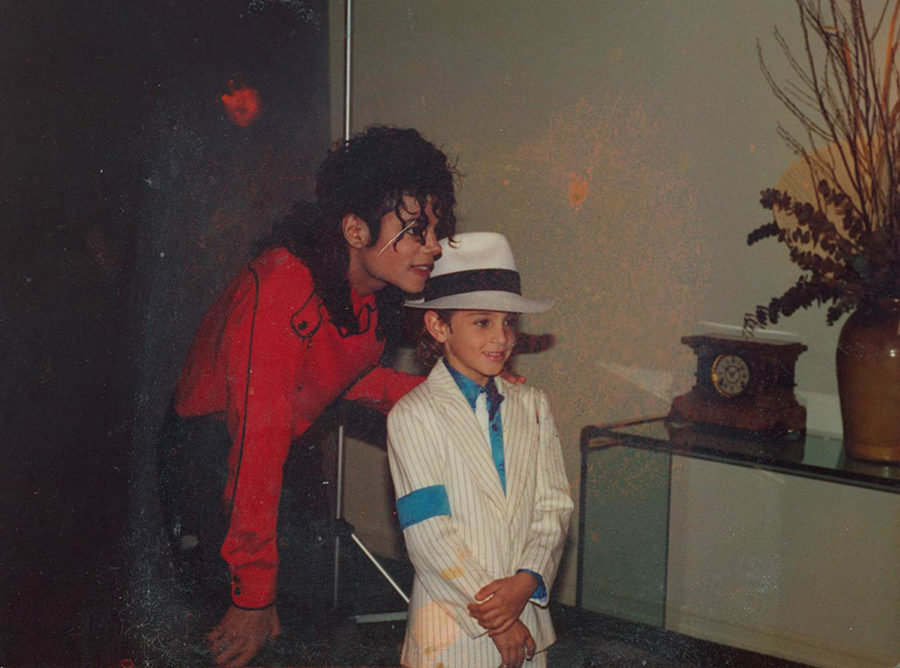Believing Neverland
The HBO Documentary “Leaving Neverland” sparks a debate over the validity over the innocence of Michael Jackson
PHOTO | TNS
Michael Jackson and Wade Robson in “Leaving Neverland.” (Amos Pictures/IMDb/TNS)
The Michael Jackson estate called it a “posthumous character assassination.” Rosie O’Donnell called it “haunting.” Oprah Winfrey called it “bigger than any one person.” The HBO documentary “Leaving Neverland”, focusing on the sexual abuse allegations against Michael Jackson, has divided people into two sides – those who believe in the late singer’s innocence, and those who do not. The controversy, however, points to the larger problem of society’s unwillingness to accept facts when they shine a negative light on a beloved public figure. The case against Jackson holds more weight than fans are comfortable with accepting.
When he was first accused of sexually assaulting young boys in 1993, a police search found no evidence to support the alleged abuse taking place. However, the accusations against Jackson continued to pile up over the years. Jackson was heavily monitored by the FBI in an attempt to find any evidence to support the allegations, but the surveillance revealed nothing incriminating. It all culminated to the eventual trial in 2005, in which a jury found Jackson not guilty of all charges against him at the time. Despite being found not guilty, it is an indisputable fact that Jackson had a strange habit of forming friendships with young boys. The star even admitted himself that he had shared the bed with some of them before, although he adamantly denied that there was anything sexual going on, according to Evening Standard. It’s also worth noting that even if Jackson was found not guilty, there were still three allegations of sexual abuse at the time. Gavin Arvizo, one accuser, testified under oath that he had been molested by Jackson, as did Jason Francia, who alleged that Jackson had given him money to keep him quiet. His odd relationships with children are enough to raise red flags that point that perhaps something possibly more insidious went on behind closed doors, even if he was acquitted.
The Leaving Neverland documentary itself, however, focuses on the more recent allegations by Wade Robson and James Safechuck. The documentary is uncomfortable to watch, going into extreme detail to paint a disturbing picture of the way Jackson treated the boys who stayed at Neverland Ranch. It focuses on the alleged victims, rather than focusing on the fame of the abuser. At the time of the trial against Jackson, both Robson and Safechuck testified that Jackson had never behaved inappropriately towards them, according to NPR. However, they now alleged that they were also victims of Jackson. The timing is suspect to those who defend the late star – why wait 14 years to come forward? The explanation is simple: victims will often be ashamed or fearful of not being believed, as such, will wait to come forward. In addition to this, Robson explained that as a child, he had no idea that what he alleges happened was wrong.
The documentary sparked outrage among die-hard fans, who refused to believe the picture it paints of Jackson. They claimed that the documentary was a smear campaign, and the Michael Jackson estate itself calls it a money grabbing attempt. These accusations don’t take into account that Robson and Safechuck both made no money off of the documentary. However, the Michael Jackson estate, worth around $825 million, does have financial motivations to disprove the documentary. After the airing of the documentary, the Indianapolis Children’s Museum removed it’s Michael Jackson paraphernalia, and the Staples Center removed Jackson’s song “Beat It” from its music line up. Any hits to Jackson’s reputation will result in monetary loss, something his estate most likely wishes to avoid.
Overall, it doesn’t matter that the accusations cannot be definitely proven – there most likely never will be final closure with these allegations, as Jackson is dead and no trial can be conducted. What matter are the facts, and the conclusions that can be drawn from it. Even if it is hard to believe that a beloved celebrity could be capable of such horrible acts, it’s important to research into the claims and consider if they hold weight. And if they do, then it’s just as important to support the victims with the same vigor as the celebrity was supported.



